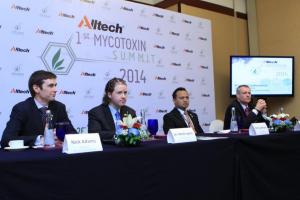Mycotoxin Summit Reveals 100% of Feed Toxic in Southeast Asia
[JAKARTA] – A survey of feed produced in Southeast Asia and within that in Indonesia, found that one hundred percent of samples tested are contaminated with multiple mycotoxins. Experts revealed the striking data during the 1st Alltech Indonesia Mycotoxin Summit. Over one hundred representatives of Indonesian feed companies and animal producers attending the event looked into a new, holistic approach that help reduce the risks associated with what experts called the “hidden killers”.
As shared during the Summit in Jakarta, over 89 feed and feed raw materials from South East Asia were sampled and tested for the presence of mycotoxins in Alltech’s 37+™ Analytical Laboratory in the United States. One hundred percent of the samples tested contained at least two mycotoxins while 10-17 percent contained 6 or more mycotoxins. Fumonisin, Aflatoxin, DON, Fusaric acid and Aspergillus mycotoxin were the predominant mycotoxin groups detected.
“Each harvest season seems to bring with it a variety of challenges that farmers and producers need to tackle in order to safeguard the health of their animals and the quality of their feed. Moulds or fungi and the mycotoxins they produce are an ever present threat and effective mycotoxin management is, now more than ever, fundamental to the success of any farm or feed mill,” commented Nick Adams, global director, Alltech’s Mycotoxin Management Team during the Indonesia Mycotoxin Summit.
Dr. Nattawadee Jantasila, Technical Support, Alltech Mycotoxin Management Team Asia Pacific, spoke about the need for identifying the different contamination areas which negatively affect the animal’s health status. As part of the Mycotoxin Management Programme, Alltech has developed MIKO, a programme designed to help improve production systems on farm and at feed mills by performing an audit, determining the critical control points, establishing critical limits, monitoring procedures, corrective actions, checking procedures and protocols for recording information. “The mycotoxin management team can provide a complete contamination report and recommendations for management and nutritional applications that can assist with mycotoxin prevention and control. By using MIKO, producers can reduce areas of future mycotoxin risk and minimize the impact of existing challenges in animal health and performance. This can lead to a significant increase in profitability,” said Nattawadee.
“In the past 20 years, research has emphasized the use of modified Saccharomyces cerevisiae cell wall extract, such as Mycosorb®, in mycotoxin detoxification strategies,” said Dr Alexandros Yiannikouris, Research Group Director, Alltech USA. The highly dynamic cell wall organization is governed not only by the genome of the yeast, but also by technical characteristics and the nutritional strategy used to generate the yeast biomass. This has been investigated through genomics and can help to explain why all yeasts and yeast cell walls can present various compositions, even with the same strain, in nature.
According to Prof. G. Devegowda, Nutritional Biotechnologist, nutrients play an important role in the protection of the host against invading pathogens. Considerable research has shown that deficiencies of most nutrients impair the immune response and increase susceptibility to diseases. Severe nutrient deficiencies are particularly deleterious to the immune system when they occur early in life. Nutrient deficiencies that are especially damaging to the immune system include selenium, zinc, iron, vitamin A, linoleic acid, amino acids and many more. It is now realized that the presence of low levels of mycotoxins in poultry feed may result in poor performance, impaired immunity, vaccine failure and decreased resistance to infectious diseases.
“The increased demand on animal performance and productivity inevitably brings new challenges and risks to Indonesia’s animal production. Mycotoxins and their impact on the health and performance of animals are inherently linked to these demands, threatening the safety of feed and the security of food supply,” said Hery Santoso, General Manager, Alltech Indonesia. Santoso urged Indonesian farmers and feed millers to use effective mycotoxin management programmes in order to maintain their profitability.


